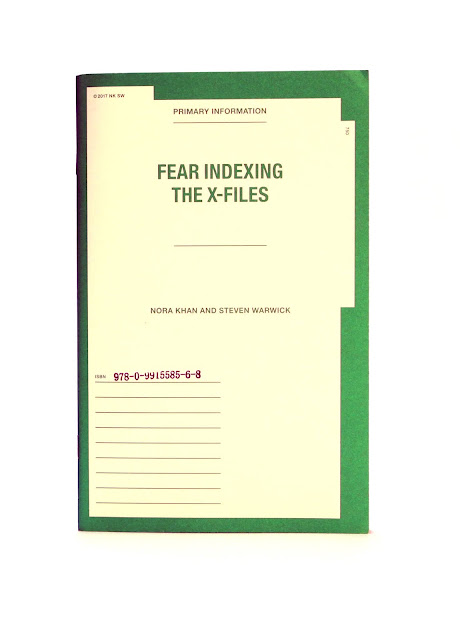Nora Khan and Steven Warwick
Fear Indexing The X-Files
New York City, USA: Primary Information, 2017
48 pp., 14 x 21.5 cm., staplebound
Edition of 750
The television series The X-Files ran for nine years on the Fox network, from September 1993 to May of 2002. It spawned two feature films, a two revival seasons, and countless books, comics and video game spinoffs.
Beyond the initial curiosity, the revival seasons were met with a lukewarm reception, suggesting that the original series was very much of its time, deeply rooted in the political climate of the 90's. The series debuted less than two years after the dissolution of the Soviet Union and the end of the Cold War, and wrapped up shortly after 9/11 and the War on Terror began. This era becomes the lens through which Khan and Warwick approach the series.
While structurally a police procedural, The X-Files also belongs to both the horror and science fiction genres (series creator Chris Carter cited The Twilight Zone as a key influence). These genres have a long history of mirroring the anxieties of the day.
King Kong ran amok in the financial capital of the country during the uncertainty of the Great Depression. In Japan, Godzilla was released less than a decade after the bombings of Hiroshima and Nagasaki, and only months after Daigo Fukuryū Maru - where a Japanese fishing boat and it's crew of 23 men were exposed to and contaminated by nuclear fallout from the US testing a 17-megaton H-bomb. If the creature's indiscriminate destruction of the city didn't make the metaphor clear enough, the monster emitted radioactive fire from it's mouth.
The fear of global nuclear annihilation seemed to culminate in the early eighties, with the release of four epic TV movies about the subject: The Day After, Threads, Testament and Special Bulletin. (That year my parents were compelled to confess the ruse of Christmas to my younger brother, when he was inconsolable with the fear that Santa Claus would be "shot down by the Russians" on Christmas Eve.)
In the seventies horror filmmakers presented grittier, grislier images in the wake of the Vietnam war coverage, and more recently 'torture porn' (the Saw franchise, Hostel) followed the news of atrocities at Abu Ghraib.
In the 1950's, there were a slew of "Invader" movies (Invasion of the Body Snatchers, Invasion of the Saucer Men, Invaders from Mars, etc.) where emotionless humanoid aliens took over the minds and bodies of earthlings, reflecting the fear of a communist takeover. This was a more insidious fear. Movies with marauding giant ants or apes might be frightening inside the cinema, but a distrust of your neighbour lingered longer. Films such as John Carpenter's The Thing (1982) - another strong influence on Carter's series - further exploited the fear of needing to know who to trust as a matter of survival.
"Trust No One" became one of two taglines for The X-Files, adorning posters, t-shirts and countless other merchandise. The second was, of course, "I Want To Believe". Faith and optimism about extra terrestrial life, coupled with paranoid suspicion about everything else.
This may be the area where the show feels most topical, today. A study in February of 2017 indicated that half of those who voted for Hillary Clinton did not trust the government to do the right thing. That figure drops in half, for Trump voters. The same 50% of Clinton voters also distrusted the media. Among Trump voters the figure rises to 85%.
Of all the fears the authors indexed from the 202 episodes of the initial run, it is the ones that speak to the erosion of trust in institutions that resonate the most: "[Carter] consciously tapped into baseless fears about topics like genetically modified bees, chemtrails, and vaccines being a kind of population mind control, and managed to root these fears firmly in the context of 90's ennui."
The documentary-style commentary of the authors befits the subject matter, and likely stems from the projects origins as a film. Khan told an interviewer a little over a year prior to the publication date:
"In collaboration with artist Steven Warwick, I am writing an essay, which will be the basis for a film. We are poring through the early seasons of the X-Files and examining Internet forum culture within the show, as it shaped and affirmed (offline) paranoiac fantasies and conspiracies about enemies of the state. The film will be presented at ICA London."
The Bill Clinton era of the series also saw the rise of the Internet, and the show's enthusiasts were as likely to be net-savvy as any. The elliptical nature of the show's unresolved plots led to crowded fan forums and chat rooms, where every detail could be examined at length for clues. Fans could speculate on where the show was headed, or invent plot lines of their own (I'm sure 'Fan Fiction' can be traced further back to Star Trek, but for me the quintessential examples of the genre are the hastily uploaded, grammatically challenged stories in which Mulder and Scully fuck).
Today the sites are different (4chan, Reddit, etc) and the conspiracy theories discussed are QAnon, Sandy Hook, 9/11-as-inside job, etc. Whereas these bizarre rants might've once been shouted on a street corner from a man selling pencils from a cup, they are no longer the domain of the marginalized fringe.
While the series itself now seems quaint in comparison, an 'indexing' feels remarkably topical. I was initially expecting a compendium more along the lines of Olivier Lebrun's A Pocket Companion To Books From The Simpsons - which might have also been great - but this straight ahead essay approach feels more necessary.
Originally selling for $12, the title is long out-of-print.


No comments:
Post a Comment